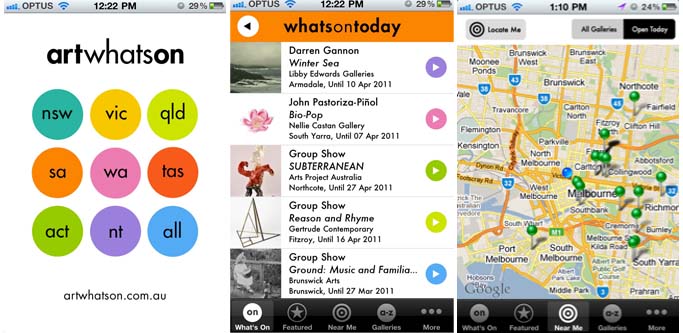Weekly news round-up: who’s who in Australia, cool iPhone apps, and updates from Japan and Libya
WONDERING what’s happening around the world this week? Connie Foong and Marcella Purnama give you a run-down of issues big and small, events near and far. This week it’s about the people who hold power in Australia, updates of events in Japan and Libya, and mobile phone apps that help you discover the world of art.
.
Who’s who in Australia
What has Australian politics got to do with my life?
Everything.
Especially since you’ll be spending the next couple of years here in Melbourne. Even if you can’t vote, it’s still worth knowing who the decision-makers are in this country and how these decisions will shape the way you live your life.
Australia, officially known as the Commonwealth of Australia comprises six states (Western Australia, New South Wales, South Australia, Tasmania, Victoria and Queensland) and two major mainland territories (Northern Territory and the Australian Capital Territory).
Contrary to popular belief, Sydney is not the capital; the capital city is Canberra, which is in the ACT.
[youtube]http://www.youtube.com/watch?v=tjGnHKe0v5s&[/youtube]
Australia is a democracy, and follows a parliamentary system. There are three levels of government: federal, state, and local.
The Federal Government is the highest level of government and looks after nation-wide affairs. It is headed by the Prime Minister (currently Julia Gillard, who is also Australia’s first female PM). Federal elections are held every three years, and voting is compulsory for all citizens.
The Parliament of Australia is responsible for making the laws that govern the nation. It comprises the Senate (Upper House) and the House of Representatives (Lower House). Government bills and legislature must be passed through the two houses in order to become law.
There are three major parties in Australia. The Australian Labor Party (ALP) is the oldest party, and is centre left. The Liberal Party of Australia and the National Party of Australia are both centre right, and both of them form the Coalition.
Minor parties include the Australian Greens, who focus on grassroots democracy and environmentalism, and the Family First Party, who are social conservatives and focus on family values.
Then there are the independents, that is, the non-party politicians who are not affiliated to any political party.
One level down and you’ve got the state governments, led by their respective Premiers. Victoria’s Premier is Ted Baillieu. State elections are held every four years (with the exception of Queensland, where it is held every three years).
The police and education system are under the jurisdiction of the state.
The local government (city councils or shires) looks after much of the day-to-day running of cities, including waste management, streetlights, road maintenance, public parks and communities facilities like parks and libraries. There are about 700 local councils in Australia. If you live in Melbourne, your local government is the City of Melbourne, and the man leading it is the Lord Mayor Robert Doyle.
.
Update on events in Japan…
Japan is still dealing with impact of the devastating 9.0-magnitude earthquake and tsunami that struck the nation’s northon March 11.
The primary concern has shifted to the unfolding nuclear crisis at the Fukushima nuclear power stations, with fears of radiation and health risks. Japanese authorities are still struggling to cool down the nuclear fuel.
[youtube]http://www.youtube.com/watch?v=nzNdK_uKLBU[/youtube]
High radiation has now been confirmed in spinach and milk farms near the nuclear plant. Many countries have also advised their people to avoid traveling to Japan unless absolutely necessary.
The New York Times has a good interactive graphic on what happens in a meltdown.
.
… and Libya
The situation in Libya continues to worsen between Qaddafi loyalists and rebel forces, in spite of the Libyan government promising a cease-fire in light of a resolution passed by the United Nations Security Council.
The United States and its allies began their military attacks on Libya last Sunday March 20.
The resolution was passed by the UNSC on Friday, effectively authorising the use of force if needed, allowing the international community to take “all necessary measures” to protect civilians in Libya, as well as demanding an “immediate ceasefire and a complete end to violence and all attacks against and abuse of civilians”.
The Council also established a no-fly zone in Libyan airspace, banning all flights except for those used for humanitarian purposes.
Australian online art guide: the artwhatson app
And now for something on the lighter side… we’ve discovered a great little iPhone app that puts the world of Australian art in your pocket. And the best part is that it’s FREE!
The location-driven app allows you to find out what’s on nearby and access gallery and exhibition info on the go. You can browse hundreds of exhibitions happening right now, sorted by gallery, location or days till end. It also includes maps, directions and opening times.
And now, the good news for those who don’t have an iPhone, you can visit the artwhatson.com.au website.

